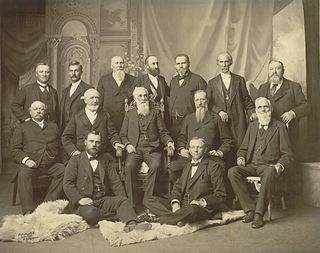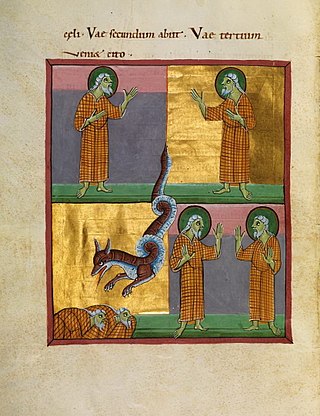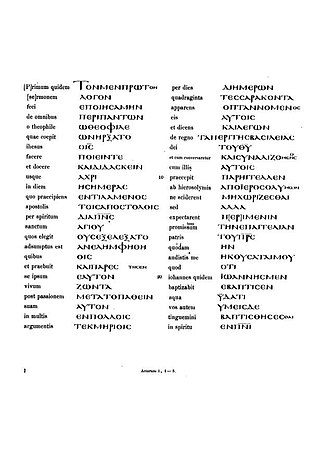Related Research Articles

The Acts of the Apostles is the fifth book of the New Testament; it tells of the founding of the Christian Church and the spread of its message to the Roman Empire.

James the Just, or a variation of James, brother of the Lord, was a brother of Jesus, according to the New Testament. He was the first leader of the Jerusalem Church of the Apostolic Age. Traditionally, it is believed he was martyred in AD 62 or 69 by being stoned to death by the Pharisees on order of High Priest Ananus ben Ananus. James, Joses, Simon, and Judas are mentioned as the brothers or siblings of Jesus as well as two or more unnamed sisters.
In the Latter Day Saint movement, an apostle is a "special witness of the name of Jesus Christ who is sent to teach the principles of salvation to others." In many Latter Day Saint churches, an apostle is a priesthood office of high authority within the church hierarchy. In many churches, apostles may be members of the Quorum of the Twelve and First Presidency of the church. In most Latter Day Saint churches, modern-day apostles are considered to have the same status and authority as the Biblical apostles.

In the Church of Jesus Christ of Latter-day Saints, the Quorum of the Twelve Apostles is one of the governing bodies in the church hierarchy. Members of the Quorum of the Twelve Apostles are apostles, with the calling to be prophets, seers, and revelators, evangelical ambassadors, and special witnesses of Jesus Christ.

The Church of God of Prophecy (COGOP) is a Holiness Pentecostal Christian Church. It is one of six Church of God bodies headquartered in Cleveland, Tennessee that arose from a small meeting of believers who gathered at the Holiness Church at Camp Creek near the Tennessee/North Carolina border on Saturday, June 13, 1903.
The Church of God is a holiness Pentecostal body that descends from the Christian Union movement of Richard Spurling, A. J. Tomlinson and others. They consider themselves officially The Church of God, but also designate themselves as The Church of God (1957 Reformation) and The Church of God (Jerusalem Acres), which is the name of their headquarters.
The Church of God for All Nations is a Holiness Pentecostal body of Christians.

The Churches of God (Seventh Day) is composed of a number of sabbath-keeping churches, among which the General Conference of the Church of God, or simply CoG7, is the best-known organization. The Churches of God (Seventh Day) observe the Sabbath on Saturday, the seventh day of the week.
In the Latter Day Saint movement, a quorum is a group of people ordained or endowed with priesthood authority, and organized to act together as a body. The idea of a quorum was established by Joseph Smith early in the history of the movement, and during his lifetime it has included several church-wide quorums, including the First Presidency, the Presiding High Council, the Quorum of the Twelve Apostles, the Anointed Quorum, and the Quorum of the Seventy, as well as numerous local quorums for each congregation. The Council of Fifty, or General Council, was not part of the church, but a quorum-like body designed as a forerunner to establishing a theocratic government.

In Christianity, the Confession of Peter refers to an episode in the New Testament in which the Apostle Peter proclaims Jesus to be the Christ. The proclamation is described in the three Synoptic Gospels: Matthew 16:13–20, Mark 8:27–30 and Luke 9:18–21. Depending on which gospel one reads, Peter either says: 'You are the Messiah' or 'the Christ' ; or 'You are the Messiah, the Son of the living God',, or 'God's Messiah' or 'The Christ of God'.

The two witnesses are two literary figures who are mentioned in Revelation 11:1-14. Some Christians interpret this as two people, two groups of people, or two concepts. Some believe they are Enoch and Elijah, as in the Gospel of Nicodemus, since they are the only two that did not see death as required by the Scriptures, while others believe them to be Moses and Elijah because they appeared during the transfiguration of Jesus, or because Enoch was not Abraham's descendant. They have the power to shut the heavens (Elijah) and turn water into blood (Moses).
In Christianity, an elder is a person who is valued for wisdom and holds a position of responsibility and authority in a Christian group. In some Christian traditions an elder is an ordained person who serves a local church or churches and who has been ordained to a ministry of word, sacrament and order, filling the preaching and pastoral offices. In other Christian traditions, an elder may be a lay person serving as an administrator in a local congregation, or be ordained and serving in preaching or pastoral roles. There is a distinction between ordained elders and lay elders. The two concepts may be conflated in everyday conversation. In non-Christian world cultures the term elder refers to age and experience, and the Christian sense of elder is partly related to this.
The Old Testament is the first section of the two-part Christian biblical canon; the second section is the New Testament. The Old Testament includes the books of the Hebrew Bible (Tanakh) or protocanon, and in various Christian denominations also includes deuterocanonical books. Orthodox Christians, Catholics and Protestants use different canons, which differ with respect to the texts that are included in the Old Testament.

The following outline is provided as an overview of and topical guide to Christianity:

The keys of the kingdom is a Christian concept of eternal church authority. Christians believe it was established in the 1st century AD, initially through Saint Peter then through the rest of the 12 Apostles. The latter, continuing with the early Church Fathers, would eventually comprise the early church and its doctrine. It is this authority, having been given the keys, that subsequent doctrinal points have been built upon.

In Christian theology and ecclesiology, the apostles, particularly the Twelve Apostles, were the primary disciples of Jesus according to the New Testament. During the life and ministry of Jesus in the 1st century AD, the apostles were his closest followers and became the primary teachers of the gospel message of Jesus. There is also an Eastern Christian tradition derived from the Gospel of Luke that there were seventy apostles during the time of Jesus' ministry.

An apostle, in its literal sense, is an emissary. The word is derived from Ancient Greek ἀπόστολος (apóstolos), literally "one who is sent off", itself derived from the verb ἀποστέλλειν (apostéllein), "to send off". The purpose of such sending off is usually to convey a message, and thus "messenger" is a common alternative translation; other common translations include "ambassador" and "envoy". The term in Ancient Greek also has other related meanings.

Acts 1 is the first chapter of the Acts of the Apostles in the New Testament of the Christian Bible. The book containing this chapter is anonymous, but early Christian tradition affirmed that Luke composed this book as well as the Gospel of Luke. This chapter functions as a transition from the "former account" with a narrative prelude, repeated record of the ascension of Jesus Christ with more detail and the meeting of Jesus' followers, until before Pentecost.

Ephesians 4 is the fourth chapter of the Epistle to the Ephesians in the New Testament of the Christian Bible. Traditionally, it is believed to have been written by Apostle Paul while he was in prison in Rome, but more recently, it has been suggested that it was written between AD 80 and 100 by another writer using Paul's name and style. This chapter is a part of Paul's exhortation, with the particular section about the mutual interdependence of the Christians as the church and how they should live in the world (4:17–5:20).
Grady R. Kent, was an American theologian and preacher who worked closely with A.J. Tomlinson in the early years of Church of God of Prophecy, and later went on to establish The Church of God. His life included the formation of numerous material programs like the Fields of the Wood and the Joel's Horsemen Christian motorcycle group, which he used to spread the message of the church.
References
- ↑ "Heritage | Church of God" (PDF). Archived from the original (PDF) on 2019-07-12. Retrieved 2016-03-23.
- ↑ "Archived copy" (PDF). Archived from the original (PDF) on 2018-02-19. Retrieved 2016-03-23.
{{cite web}}: CS1 maint: archived copy as title (link) - ↑ "Romans 2 :: New International Version (NIV)".
- ↑ "Acts 1:18-26 NIV - - Bible Gateway".
- Manual of Apostles Doctrine and Procedure of The Church of God: Section I, D,2: "History"
- Manual of Apostles Doctrine and Procedure of The Church of God: Section II: "Governmental Structure"